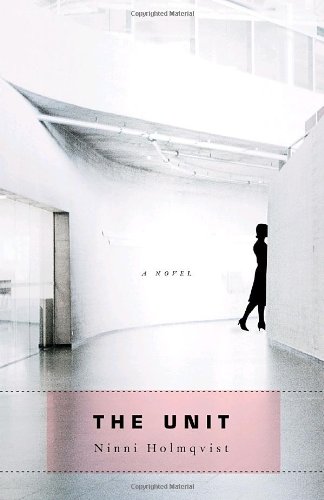
Preview The Unit
When Dorrit Wegner turned fifty, the government transferred her to a state-of-the-art facility where she can live out her days in comfort. Her apartment is furnished to her tastes, her meals expertly served, and all at the very reasonable non-negotiable price of one cardiopulmonary system. Once an outsider without family, derided by a society bent on productivity, Dorrit finds within The Unit the company of kindred spirits and a dignity conferred by 'use' in medical tests. But when Dorrit also finds love, her peaceful submission is blown apart and she must fight to escape before her 'final donation'.
Amazon.com ReviewBook Description
One day in early spring, Dorrit Weger is checked into the Second Reserve Bank Unit for biological material. She is promised a nicely furnished apartment inside the Unit, where she will make new friends, enjoy the state of the art recreation facilities, and live the few remaining days of her life in comfort with people who are just like her. Here, women over the age of fifty and men over sixty–single, childless, and without jobs in progressive industries–are sequestered for their final few years; they are considered outsiders. In the Unit they are expected to contribute themselves for drug and psychological testing, and ultimately donate their organs, little by little, until the final donation. Despite the ruthless nature of this practice, the ethos of this near-future society and the Unit is to take care of others, and Dorrit finds herself living under very pleasant conditions: well-housed, well-fed, and well-attended. She is resigned to her fate and discovers her days there to be rather consoling and peaceful. But when she meets a man inside the Unit and falls in love, the extraordinary becomes a reality and life suddenly turns unbearable. Dorrit is faced with compliance or escape, and…well, then what?
The Unit is a gripping exploration of a society in the throes of an experiment, in which the “dispensable” ones are convinced under gentle coercion of the importance of sacrificing for the “necessary” ones. Ninni Holmqvist has created a debut novel of humor, sorrow, and rage about love, the close bonds of friendship, and about a cynical, utilitarian way of thinking disguised as care.
A Q&A with Ninni Holmqvist
Question: The Unit is not set in the present, but its echoes of present-day issues are clear and ominous. Describe the world of The Unit.
Ninni Holmqvist: The Unit is a dystopia set in a near future. It is about people who don’t have any children or anyone else who loves them and need them, and who aren’t useful to the society in any other way either. These people are called “dispensable,” and they are picked up at their homes at a certain age (women at 50, men at 60) and taken to special units (“reservbanksenhet” in Swedish) for biological material, where they are supposed to serve the society through participating in various tests (like animal testing but made on people), but also, eventually, by donating organs to those of the society’s needed citizens—the ones who produce and raise children, the loved ones, the ones who contribute to the economic growth—who are afflicted with severe illnesses and need organs from healthy bodies to survive. Dorrit Weger, who just turned 50, is one of those dispensable. She is a writer, childless, quite poor, and lives alone with her dog. The story begins with her arrival at the unit, an establishment/institution she immediately finds a lot more comfortable and human and loving and beautiful than she ever could have expected.
Question: The Unit raises a number of complex—and sometimes disturbing—ethical questions. Do you see the novel as having a central moral theme?
Ninni Holmqvist: The book is above all written as a critique of society and the way political leaders today see everything in figures and numbers. But my aim was also to raise questions like: What is freedom? What is human dignity? How do we humans value our selves and each other? But The Unit is also very much a story about love (Dorrit meets the love of her life at the unit, a man called Johannes, and she also, miraculously, gets pregnant) and friendship and loyalty.
Question: Who did you write The Unit for? Did you have someone—personally, or in society—that you intended the story for?
Ninni Holmqvist: My intention was that it is for everyone. But I guess it might especially appeal to middle-aged single people, childless ones. But also people who are in or are close to other categories of “dispensable” people: disabled people for instance, long time unemployed persons, culture workers. And people who are critical of capitalism and economism. Perhaps also people who don’t mind being provoked.
From Publishers WeeklySwedish author Holmqvist's unconvincing debut, part of a wave of dystopias hitting this summer, is set in a near future where men and women deemed dispensable—those unattached, childless, employed in nonessential professions—are checked into reserve bank units for biological material and become organ donors and subjects of pharmaceutical and psychological experiments. When Dorrit Weger, who has lived her adult life isolated and on the brink of poverty, is admitted to the unit, she finds, to her surprise, comfort, friendship and love. Though the residents are under constant surveillance, their accommodations are luxurious, and in their shared plight they develop an intimacy rarely enjoyed in the outside world. But an unlikely development forces Dorrit to confront unexpected choices. Unfortunately, Holmqvist fails to fully sell the future she posits, and Dorrit's underdeveloped voice doesn't do much to convey the direness of her situation. Holmqvist's exploration of female desire, human need and the purpose of life has its moments, but the novel suffers in comparison with similar novels such as The Handmaid's Tale and Never Let Me Go. (June)
Copyright © Reed Business Information, a division of Reed Elsevier Inc. All rights reserved.
